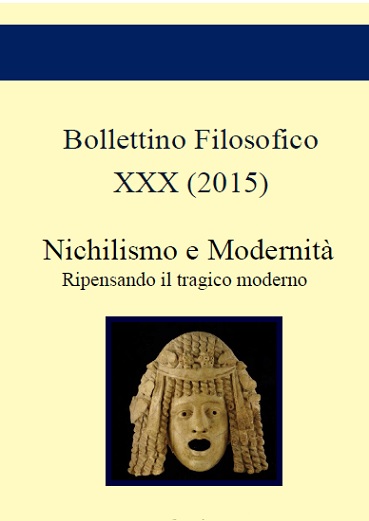On the Paraethical: Gillian Rose and Political Nihilism
Abstract
The English Hegelian philosopher Gillian Rose attempted a remarkable critique of postmodern and poststructuralist thought, aiming to eschew its celebration of nothingness and death and promotion of an impossibilist ethic, removed from all the circumstances of historical actuality. By contrast to unsituated critiques of all law and governance in the name of aleatory difference and liberty, she insisted on the legal and political framing of all human thought and association. However, the very rigour of her analysis tends to reveal, as in the case of Žižek who was eventually influenced by her, that Hegel's immanent and all-inclusive rationalist horizon is itself nihilistic, suggesting the ultimate proximity of the modern and the postmodern. Rose rightly argued that without 'middle' institutions of civil society, integrating personal with political flourishing, there can be no social nor political order. Yet she also contented that the very emancipatory basis of modern society “dirempts” the personal from the political and the ethical from the legal. The middle has to remain, yet it is now ineluctably broken. Thus latent within her thought, but not fully admitted is the argument that any dialectical attempt to extend enlightenment by healing it through a restoration of the middle will also offend enlightenment in seeking to return to the premodern or “feudal”. Hence attempts at reform that Rose herself would seem to half-endorse can only give rise to ersatz 'holy middles' which are themselves ethically estranged from law. Their promotion can only land up reinforcing diremption after all. Thus Rose's 'modernism' looks postmodern after all -- change towards justice becomes aporetic and impossible; attempts to mend must further break apart. To go beyond this one must first point out that not all positive, analogical mediations in human history have been “feudal”. Second that the primacy of the [political ignores the even greater primacy of the religious, that is able to integrate the ethical with the “paraethical” -- with circumstances but half-chosen by us -- in a way that does not see this realm as simply violent and outside the ethical, a Machiavellian assumption endorsed by Rose and which is the final basis of her claim for the non-surpassability of diremption. Today the only hope for surpassing political nihilism is a religious reinsertion of the mediating power of corporate bodies, able to relate personal finality to shared human purposes in time.Downloads
The author retains the copyright of his work whilst granting anyone the possibility “to reproduce, distribute, publicly communicate, publicly exhibit, display, perform and recite the work”, provided that the author and the title of the journal are cited correctly. When submitting the text for publication the author is furthermore required to declare that the contents and the structure of the work are original and that it does not by any means compromise the rights of third parties nor the obligations connected to the safeguard of the moral and economic rights of other authors or other right holders, both for texts, images, photographs, tables, as well as for other parts which compose the contribution. The author furthermore declares that he/she is conscious of the sanctions prescribed by the penal code and by the Italian Criminal and Special Laws for false documents and the use false documents, and that therefore Bollettino Filosofico is not liable to responsibilities of any nature, civil, administrative or penal, and that the author agrees to indemnify and hold Bollettino Filosofico harmless from all requests and claims by third parties.
